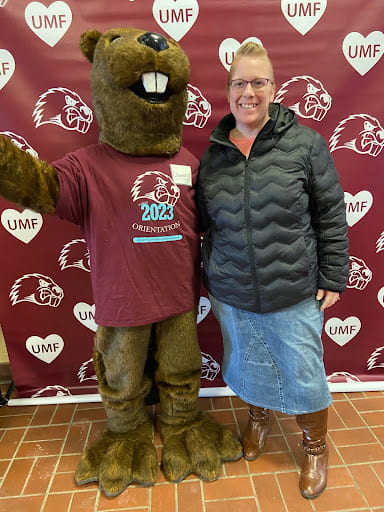By Charity Webster, contributing writer.
What do you know about the student sitting next to you? Has the student been here before? Can the student use Google Drive or Brightspace? Are they jumping hurdles daily just to be in class? Did they just receive a disturbing text as they entered class? Is the student playing a balancing act with non-student life and school? Maybe the student isn’t the typical student just out of high school and living on campus.
The non-traditional student always has a backstory of how and why the student has restarted or started at the given time. As a non-traditional student myself, my story is long and all over the place. I have never wanted to give up on my dreams though and always have been a hard worker. I feel my course was just derailed for a time. I found myself on a different road and successful in my social work career, but at a turning point in my life. When the road brought me back full-circle, I re-enrolled again in 2019 at UMF. Having been away from college for eighteen-plus years, I really had no idea what I was getting into when I started again. My life was in a totally different place than the average student and now I wanted to prove something to myself and to my family. I could do this!
The National Center for Education Statistics defines non-traditional students “as meeting one of seven characteristics: delayed enrollment into postsecondary education; attends college part-time; works full time; is financially independent for financial aid purposes; has dependents other than a spouse; is a single parent.”
Henry O’Shaughnessy is currently a non-traditional student at UMF and a sophomore in an Undeclared Liberal Arts Major. Even at his current state and being in college before, volunteering for Habitat for Humanity, and being a part of the Americorp and Triple C, he still isn’t sure what he wants for a degree. He does know he wants to get an education and complete what he started almost 10 years ago. He too, has a story that has brought him back full-circle. O’Shaughnessy graduated from York High School and went to college right out of high school in a small town in Pennsylvania.
“College was a blast socially and academically, I was having a lot of fun. So much fun that I got kicked out not just once but twice. This was after I attended counseling to return to school but yet again got kicked out,” O’Shaughnessy said. Several months after being kicked out, O’Shaughnessy was in a major car accident as a passenger and broke his back in three different places. He lay there for several months in recovery. During that time he reflected and decided he wanted to give more of himself so he went into Americorp and Triple C for volunteering, traveled the country, and hiked the Appalachian trail. Now in his late 20’s ,he has decided to return to UMF and pursue a degree. “I had the realization of what I was going to do- I didn’t have a skill set or a degree. This is why I came back to get my degree so I can get a decent job and maintain the traveling lifestyle,” O’Shaughnessy said.
Both O’Shaughnessy and I face daily challenges in our choice to return to college, each of us have our own stories. Maybe the student sitting next to you is a non-traditional student, one with a more unorthodox set of problems. For example, having five children all with their own disabilities or working full time at an elementary school as a music teacher. Or my elderly mom and ill sister-in-law living with me and my mother-in-law living next door. Or that my husband and I are the Children’s Pastor at our church. So why take on the new challenge of going back to College when I seem to have a full life? Well something was unfinished and my new career path–my destiny of sorts– required it. So here I am!
O’Shaughnessy is a man in his 20’s who has been all over North America and South America volunteering and doing things for the communities that are struggling, working when he can, and has an amazing circle of friends and family- so why return to school now? Again, due to unfinished business and needing a sense of completion and success.
What does UMF offer the non-traditional student? What makes UMF more desirable over other colleges? “Well the cost was one of the biggest advantages, since I need to pay for it on my own and I have an apartment,” O’Shaughnessy said. Proximity and cost was definitely a factor for me. Also, there is a well-developed education program, and that is my degree focus. However, the number one factor for me was the support I received to help accomplish my goals and complete my degree fast. Stephen Davis and Lori Soucie are on my side, both advisors that have both spent hours reviewing my transcripts and my path projection. They have given me pointers on how to finish and meet the requirements for the Maine Department of Education and my degree focus. I had the task of meeting the degree program requirements and the Department’s requirements to get my Music Education Certification.
What are some advantages that non-traditional students may have? They tend to be more ready for what college sends their way. Homework isn’t such a challenge and time management is usually not a problem. UMF offers some unique things to the non-traditional student such as the option of daycare right on campus for your children. Also, as non-traditional students commute to and from campus in Maine winters, they offer students a place to stay for $5 a night on campus. You just need to contact Campus Security and they can hook you up. Finally, as a non-traditional student, you may face challenges daily but why not do that on a campus that has your back 100%?
